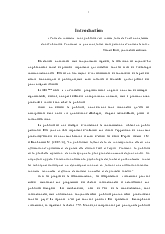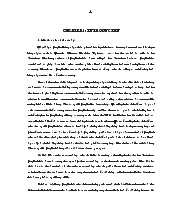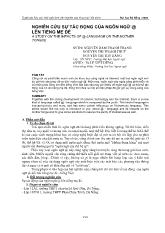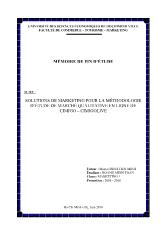A study on the effectiveness of cognitive strategies in learning vocabulary of non-Major students of english at nghe an continuing education center
- Người chia sẻ :
- Số trang : 46 trang
- Lượt xem : 28
- Lượt tải : 500
Các file đính kèm theo tài liệu này
 Phan%20chinh%20Luan%20van%20Nhung.doc
Phan%20chinh%20Luan%20van%20Nhung.doc Phan%20dau%20luan%20van%20Nhung.doc
Phan%20dau%20luan%20van%20Nhung.doc Phan%20sau%20luan%20van%20Nhung.doc
Phan%20sau%20luan%20van%20Nhung.doc
- Tất cả luận văn được sưu tầm từ nhiều nguồn, chúng tôi không chịu trách nhiệm bản quyền nếu bạn sử dụng vào mục đích thương mại
Bạn đang xem trước 20 trang tài liệu A study on the effectiveness of cognitive strategies in learning vocabulary of non-Major students of english at nghe an continuing education center, để xem tài liệu hoàn chỉnh bạn click vào nút DOWNLOAD LUẬN VĂN ở trên
Our students are often frustrated with trying to learn new words. We cannot count how many times the students have come up to us to express their frustration with vocabulary when they say things like, “I have such a high level of vocabulary in my language, so it is very frustrating that I can’t express myself as well in English. What can I do? How can I increase my vocabulary?” or “Why is my use of this word awkward? How can I use new words that I learn?” or “I need to use my dictionary. How can I read without using my dictionary? – It’s too hard!” We hope by teaching them the strategies of elaboration it will help them with learning vocabulary and minimize some of their frustrations. Vocabulary is an essential constituent of second language acquisition and is of great significance to language learners. Without words that are the building blocks of a language, a speaker cannot convey the intended meaning. “Learning the most frequent 2 – 3,000 words in a language provides a firm basis of about 80 percent of the words likely to be encountered” (Carter, 1988, p.166). Learning vocabulary is the important basis to gain all other skills. Vocabulary deficiency leads to poor reading comprehension, poor listening comprehension, poor writing performance, poor conversational competence and poor grammatical knowledge. Thus, vocabulary learning is one of the major challenges foreign language learners face during the process of learning a language. One way to alley the burden is to assist students in becoming independent learners during the process of L2 vocabulary learning. To do this task, we have to know the strategies that the learners are using as well as the effectiveness to teach suitable vocabulary learning strategies (VLS) because learning strategies instruction can help “EFL learners become better learners. In addition, skill in using learning strategies assists students in Psychologists, linguists, and language teachers have been interested in VLS for a long time. Numerous studies have been conducted comparing the retention effects of different vocabulary presentation strategies. In fact, the vocabulary field has been especially productive in the last two decades. We have seen a number of classic volumes on theories (e.g., Carter, 1987; Carter & McCarthy, 1988; Mc Carthy, 1990; Nation, 1990), researches (e.g., Arnaud & Bejoint, 1992; Gass, 1987; Meara, 1989; Nation & Carter, 1989), and practical tips (e.g., Gairns & Redman, 1986; McCarthy & O’Dell, 1994). Recent volumes shed significant light upon different aspects of vocabulary acquisition include Huckin, Haynes, and Coady (1993), Harley (1995), Hatch and Brown (1995), Coady and Huckin (1997), Schmitt and Mc Carthy (1997), Atkins (1998), Wesche and Paribakht (1999), Read (2000), Schmitt (2000), and Nation (2001). These researches solved the present problems. Hence, based on the significance attributed to VLS in the process of vocabulary learning and enhancement, this research aims at studying on the effectiveness of Cognitive Strategies (CS) in learning vocabulary.




